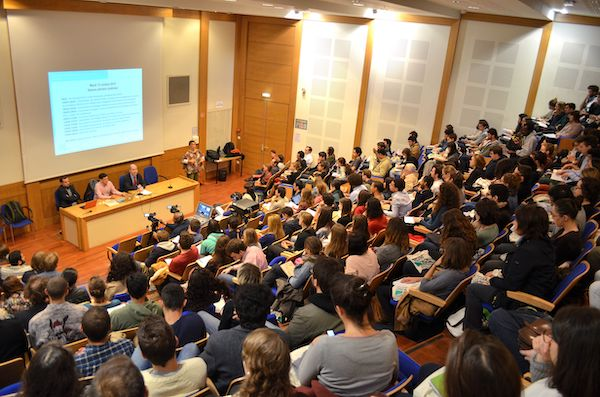The Conseil d'orientation pour l'emploi (COE) was concerned, a few months ago, about the growing shortage of expert skills in digital technologies. "Given the importance of expected job creation, the supply of skills in France is insufficient and will remain so in the years to come. We could thus expect 80,000 job vacancies by 2020 in France. This estimate concerns only the digital and electronic sectors: it does not cover the shortages that may be encountered in all sectors related to new technologies.
43,000 graduates in courses of study preparing for digital professions in 2014
The general inspections of the Ministries of Education, Research, Labor and the Economy had undertaken in 2016 to take stock of thesupply of training in digital professions in higher education. In their report, they had managed to identify, for the year 2014, a total of 27,459 graduates in computer science, math-computer science and computer science disciplines, math-info and MASS (Applied Mathematics and Social Sciences (MASS) as well as 15,835 graduates in information-communication.Of these 43,294 graduates, three-quarters were at the bachelor's and master's level, and one-quarter at the engineer, master's and doctoral level. "To these were probably added a thousand graduates from engineering schools that do not fall under the sole authority of the Ministry of Higher Education and an undetermined but probably smaller number of graduates from business schools.
Taking into account the continuation of studies by Bac + 2 graduates and Bachelor's degree graduates, the General Inspectorate report estimated that 27,000 graduates were in a position to enter the job market.
Nearly 216,000 students enrolled in training courses that prepare for digital professions in 2015
As part of their " Vision prospective partagée des emplois et des compétences dans la filière numérique" (shared vision of jobs and skills in the digital sector), France Stratégie and CEREQ recently undertook to complete and update (for 2015) this estimate, this time by focusing on the number of studentsTaking into account 6 disciplinary sectors (Computer Science, Mathematics and Information Technology, Applied Mathematics and Social Sciences, Information and Communication Sciences, Technology and Industrial Sciences), France Stratégie and Cereq count, for the 2014-2015 academic year alone, 216,000 students enrolled in public institutions under the supervision of the MESR.
Références :
- 2% of them are in doctoral programs
- 15% are in Master's level education
- 37% are studying engineering
- 45% of them are in 1st cycle training (BTS, DU, DUT, Licence)
The Technology and Industrial Sciences (STI) stream has the largest number of students with 53% of the total, followed by Computer Science (23%) and Information and Communication Sciences (20%).
45% of students enrolled are in undergraduate programs other than engineering programs (BTS, DU, DUT, Licence), 37% in engineering programs and 15% in Master's programs.
Overall, the number of students in initial training has increased by 9% in four years, with a significant increase in engineering courses (+7,000 students) and bachelor's degrees (+4,000 students) over this period.
It should be noted, however, that the number of students enrolled in doctoral programs and in the habilitation to direct research (HDR) program has decreased.
23,000 new baccalaureate holders chose one of the five digital streams in 2014-2015
For the 2014-2015 academic year, 23,000 new baccalaureate students enrolled in institutions under the supervision of the Ministry of Higher Education and Research (i.e., 8% of the total) are taking one of the five disciplines identified in this analysis as leading to digital careers.The majority of new baccalaureate holders who enrolled in one of the six courses leading to digital professions went on to technological university degrees (44%), mainly in Computer Science and InfoCom (Information and Communication Sciences) courses.
They are followed by bachelor's degrees with 31% of the total number of students, and engineering courses, mainly in technology and industrial sciences (STI).
Very few women in training
For the 2014-2015 academic year, France Stratégie and CEREQ observe that "only 32% of new baccalaureate holders enrolled in courses leading to digital professions provided by institutions under the Ministry of Higher Education and Research (MESR) are women. This average varies by field of study. In fact, it is 7% in Computer Science, compared to nearly 65% in Information and Communication Sciences.





